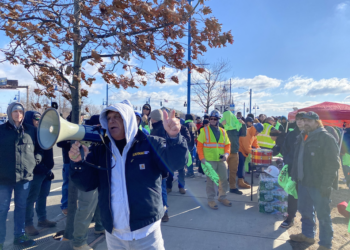Businesses and nonprofits have been hit hard by the Covid-19 pandemic. Westchester County was quick to respond and offer assistance to organizations impacted by it. While the ever-changing landscape has proven difficult, so many have shown amazing resiliency and determination to persevere.
The Westchester County Office of Economic Development launched a grant program ”” Westchester County Business FIRST: Financial Investments for Recovery and a Sustainable Tomorrow. The goal is to offer immediate financial relief to local small businesses and nonprofits.
“Small businesses are a critical artery that keeps the economy pumping for our county. We don”™t want them to be financially fragile. We recognize the difficult times and wanted to be innovative to support our small-business and nonprofit communities,” County Executive George Latimer said.
The county initially awarded a total of $10 million to 262 small businesses and nonprofits facing challenges as a result of the Covid crisis. Based on the tremendous response, the county secured $4 million in additional funding to support 175 eligible organizations and 20 chambers of commerce.
“As ”˜The Catalyst”™ for economic growth and vitality, the Office of Economic Development is here to support our small businesses and nonprofits and help get our economy back on track,” said Bridget Gibbons, Westchester County”™s director of Economic Development.
The grant recipients are found throughout Westchester and include industries such as restaurants/food service; arts, entertainment and recreation; social services; education and more. We caught up with some of the recipients to learn more about how they are navigating through the crisis and how the Business FIRST grants are helping them move forward.
ӢӢӢӢӢӢ
Founded in 2002, Westchester Children”™s Museum (WCM) is a nonprofit 501(c)3 chartered

Executive Director
Westchester Children”™s Museum
Playland, Rye
discoverwcm.org
by New York State. WCM was created as an interactive learning space to provide children, families and school groups the opportunity to nurture curiosity, enhance knowledge and ignite imagination through creative hands-on exploration. WCM”™s team began serving the county in 2010, before they even had a building. Its renowned Museum Without Walls outreach program provides STEAM ”” science, technology, engineering, art and math ”” experiences at more than 50 partner sites and has reached more than 70,000 children since its inception. In 2014, WCM opened a single gallery in the National Historic Landmark North Bathhouse adjacent to Playland Amusement Park. The museum has approximately 625 active members and was averaging some 50,000 visitors a year prior to the pandemic.
When WCM learned about the Business FIRST grant program, it applied through the county”™s website. The assistance will help the museum maintain its core staff as well as its ability to provide much-needed educational program services for its constituents.
How was business prior to the pandemic?
“Business was booming! We were just about ready to open 16,000 square feet of newly renovated space within the North Bathhouse and demand for our off-site outreach programming was growing at an exponential rate.”
When did you first feel the impact of Covid-19?
“We noticed onsite attendance dropping off dramatically the second week of March.”
How has your industry as a whole been affected?
“Nearly 60% of the children”™s museums nationwide are temporarily closed and many that have tried to reopen have had to reclose due to increases in local infection rates, governmental guidelines or the cost of operating under various restrictions. Some experts estimate that as many as 30% of the nation”™s museums will close permanently as a result of the pandemic.”
How did you begin to re-strategize?
“We quickly moved to providing online/virtual services to our members, schools and organizations in need of supplemental educational programming and entertainment. Since March, because we have been unable to open our high-touch exhibits, we have focused our efforts on video and online programming, pre-registered onsite workshops and off-site educational outreach programs. Our online outlets have had over 70,000 virtual visitors since the onset of the pandemic. WCM is honored to be serving as a resource to our community during this challenging period.”
Have you experienced anything similar over the course of your career?
“I did participate in a post-Katrina assessment for museums in New Orleans ”” but that doesn”™t compare to the sustained and uncertain impacts of a pandemic.”
How has the pandemic changed the way you think about business as usual?
“It has served as a reminder that we need to be flexible and respond as best as possible to external factors we can”™t always control.”
Aside from funding, what one thing has helped you persevere?
“The dedication and support of the museum board and staff as well encouragement from family and friends.”
What advice would you share about navigating a changed landscape?
“Don”™t go it alone ”” develop and maintain a strong network. Our partnerships with local businesses, other nonprofits, professional service organizations, community groups, clients and our members have sustained the museum through these challenging times. For example, our partnership with Volunteer New York! and Regeneron produced much ”” needed STEM programming for students at the Thomas Cornell Academy in Yonkers. We also teamed up with Rock Island Sound in Rye to produce a month of virtual musical mornings and we continue to work with the Marine Education Center in Mamaroneck to produce weekly Facebook Live learning experiences.”
ӢӢӢӢӢӢ

Recruiter/Owner and CEO
Loughlin Staffing Solutions
White Plains
loughlinstaffing.com
Based in White Plains, Loughlin Staffing Solutions is an employment/staffing firm founded in 1998. Prior to the pandemic, owner Laura Loughlin says she was “consistently busy” managing placements. By mid-April, she admits she became “really nervous” as the impacts of Covid-19 hit her business and industry. Loughlin noted Westchester”™s business community, “has always been supportive of one another, but in March of 2020 it was more apparent than ever before.” She applied for the Business FIRST grant as soon as she learned about it.
Tell us about your company”™s history.
“In 1998, I was working for another staffing firm and they decided to close their doors, quite suddenly and I made a quick decision to go out on my own. Luckily, one of the other recruiters came with me and we have been working together ever since.”
How did you begin to refocus as Covid impacted your industry?
“I think the personalization has been removed, at least temporarily. We always met with both clients and candidates in person, prior to Covid. We quickly realized that through Zoom we could continue to “meet” candidates and speak to our clients, which we really hadn”™t done too much before. We also initiated online testing, as opposed to doing everything in our office.”
Have you experienced anything similar over the course of your career?
“Not to this extent. We all felt the world change on Sept. 11, 2001 and business was quiet for a while in 2008, but what we are experiencing now is unprecedented.”
How will the Business FIRST Grant Program help you move forward?
“The program has been amazing. The grant will enable us to pay our landlord and help cover payroll expenses, insurance for our staff, and the equipment and testing services we utilize when we meet our candidates. I am so appreciative.
“Westchester County also immediately had programs in place for small businesses such as subsidizing gift cards for restaurants, providing face masks and free parking validation codes, along with free webinars, virtual events and lots of info on SBA loans, PPP, unemployment, etc.”
How have the pandemic-related events of 2020 changed the way you think about business as usual?
“I think we are all far more resilient than we realize and now we know for sure. We can”™t take anything for granted and I”™m not sure there will be ”˜business as usual”™ any more.”
Aside from financial support, what one thing has helped you persevere?
“The basic goodness in people. Everyone really pulled together, without any notice at all. My staff was willing to work, without getting paid, just to be sure we could keep on going. I will always be grateful.”
What advice would you share with fellow business owners about navigating a changed landscape?
“Don”™t get discouraged and keep on moving and changing. Oftentimes, it”™s the roadblocks in life that end up being the greatest gifts.”
ӢӢӢӢӢӢ

Interim Executive Director
Jacob Burns Film Center
Pleasantville
burnsfilmcenter.org
The Jacob Burns Film Center (JBFC) is a nonprofit arts and education hub located on a three-building campus in Pleasantville. Founded in 2001, JBFC brings the transformative power of film to the surrounding community through unique programming and discussion, shared experiences and educational initiatives.
In addition to applying for a grant through the Business FIRST Program, JBFC has been seeking creative ways to share its offerings with the community.
How is the Business FIRST grant helping the film center move forward?
“The Business FIRST grant has helped us retain and support our staff as we continue to adapt to the Covid crisis. While we are facing many challenges with our theater closed, the JBFC staff is embracing creative opportunities to reach children, adults, families and teachers.”
What are some of the unique ways you”™ve adapted to the “new normal”?
“Our education team has worked tirelessly to enhance our innovative media arts education programs to better serve students and teachers when they need us the most. Our new programs empower teachers with complete access to the JBFC”™s media literacy curricula, which helps bring media-making into the classroom and engage students using films from around the world and thoughtful conversations led by JBFC educators over Zoom. Our new Short Film Library gives teachers access to a presentation-ready film collection curated by our educators and paired with discussion questions. These virtual programs are available to teachers and students in schools throughout Westchester County completely free of charge.”
What other features can the community expect in the coming months?
“Curated by our talented programming team, the new JBFC Virtual Marquee (powered by Eventive) will launch in mid-February. Through the Virtual Marquee, our audiences will have access to an ongoing selection of new releases, repertory films, and curated series ”” all in one place. The JBFC is thrilled to offer two virtual series shortly after the platform”™s launch, ”˜Making Waves: New Romanian Cinema”™ and ”˜Contemporary Arab Cinema.”™”
What else has helped the film center persevere?
“Thanks to our remarkable and dedicated staff, JBFC continues to create new opportunities to engage, connect and inspire people of all ages through the power of film.”
These interviews were coordinated by Caryn McBride of Co-Communications in White Plains.





















